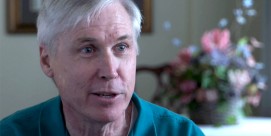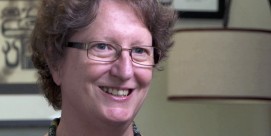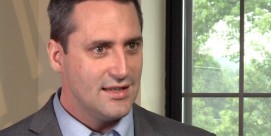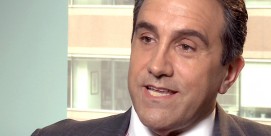In This Episode << SLIDE LEFT TO SEE ADDITIONAL SEGMENTS
Richard Land Extended Interview
Read more of Bob Abernethy’s interview with Richard Land:
Q: E.O. Wilson says that up to half of the 10 million or so species could be gone by the end of this century unless we take some action. He wants what he calls the two most powerful social forces on earth, science and religion, to put aside their differences and work together to save biodiversity, which he calls also “the Creation.” He writes this in the form of a letter to an imaginary Southern Baptist pastor. You are a real Southern Baptist minister. How do you respond to him?
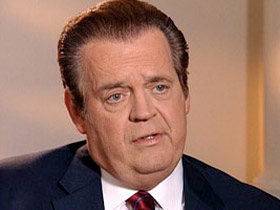 A: I believe that as Christians we have an obligation and a responsibility for creation care, and I think there are points at which we can make common ground. It’s interesting that when he’s making the self-interested argument — you know, human beings need to preserve the species because it’s good for human beings — he uses one of the examples that I use in the book that I wrote in 1992 called THE EARTH IS THE LORD’S: the rosy periwinkle. The rosy periwinkle is this little tiny flower that was on the verge of extinction in the Amazon rainforest when they discovered that there’s an enzyme that was previously unknown that can be extracted from the rosy periwinkle (and now, of course, can be made chemically) that is one of the most important treatments we have for leukemia and for other diseases of the blood. And the argument that I made is that if we believe as Christians that God created everything — God is a God of order, not a God of discord, not a God of chaos — and if he created everything he created everything for a purpose and we ought to, as an act of stewardship, try to keep some of everything that God created alive until we discover God’s purpose for it and then use it for that purpose. I use the rosy periwinkle as an example. [Wilson], coming at it from a slightly different direction, uses the same example of the rosy periwinkle. I would say that as a Christian we believe that the earth is the Lord’s. It is divine ownership. God owns the Earth, we don’t own it. We don’t have the right to treat it as if we own it. Secondly, we have human responsibility. Genesis chapter 1 tells us that God put man in charge under his headship. Human beings have dominion and are given dominion, but then that’s tempered by Genesis chapter 2, where man is put into the garden to till it and to keep it. The word “keep” means to guard and to protect. We would call it Earth-care creation here. To till it means to cause it to bring forth its fruit, to plow it, to cultivate it. We’re not to just worship nature in its pristine form. We have a divinely mandated responsibility to both develop the Earth for human betterment and to protect it and guard it and keep it and to exercise creation care. And we will give an account of our stewardship.
A: I believe that as Christians we have an obligation and a responsibility for creation care, and I think there are points at which we can make common ground. It’s interesting that when he’s making the self-interested argument — you know, human beings need to preserve the species because it’s good for human beings — he uses one of the examples that I use in the book that I wrote in 1992 called THE EARTH IS THE LORD’S: the rosy periwinkle. The rosy periwinkle is this little tiny flower that was on the verge of extinction in the Amazon rainforest when they discovered that there’s an enzyme that was previously unknown that can be extracted from the rosy periwinkle (and now, of course, can be made chemically) that is one of the most important treatments we have for leukemia and for other diseases of the blood. And the argument that I made is that if we believe as Christians that God created everything — God is a God of order, not a God of discord, not a God of chaos — and if he created everything he created everything for a purpose and we ought to, as an act of stewardship, try to keep some of everything that God created alive until we discover God’s purpose for it and then use it for that purpose. I use the rosy periwinkle as an example. [Wilson], coming at it from a slightly different direction, uses the same example of the rosy periwinkle. I would say that as a Christian we believe that the earth is the Lord’s. It is divine ownership. God owns the Earth, we don’t own it. We don’t have the right to treat it as if we own it. Secondly, we have human responsibility. Genesis chapter 1 tells us that God put man in charge under his headship. Human beings have dominion and are given dominion, but then that’s tempered by Genesis chapter 2, where man is put into the garden to till it and to keep it. The word “keep” means to guard and to protect. We would call it Earth-care creation here. To till it means to cause it to bring forth its fruit, to plow it, to cultivate it. We’re not to just worship nature in its pristine form. We have a divinely mandated responsibility to both develop the Earth for human betterment and to protect it and guard it and keep it and to exercise creation care. And we will give an account of our stewardship.
Q: The word “stewardship” means different things to different people. I think to Professor Wilson it means taking very, very good care of all the species and not using them, perhaps, to their destruction for our own purposes. Where do you differ with Professor Wilson? It sounds, as you say it, as if there’s no difference, but I suspect there is on this question of to what extent we should make it a goal of ours as people to preserve all 10 million species.
A: I think that one of the areas where there would be profound disagreement is in the nature of humanity as a species and humanity’s place in creation. On page 54 of his book he says, “Let us think upon what we and the other aliens are doing to the rest of life, and to ourselves.” He’s talking about alien species that have been brought into places which are not their natural habitat. Now what he’s clearly saying — and he defines nature, by the way, exclusive of humanity; he does that earlier in the book. Nature with a capital “N” is exclusive of human imprint on nature, i.e. the human species. He looks upon human beings as an alien species to the habitat of nature and that we are the ones that are destructive and that we have been a catastrophic event. Nature would have been far better off without human beings. As a Christian we believe that God created the creation for humankind and that he created it for humankind, and he placed humankind within it. So while we are to give respect to all life, God made a covenant with all of life, with every living creature in Genesis chapter 9, and we don’t have the right to treat any life with disrespect. We must treat human life with reverence, and there is in Christian theology a hierarchy of species, and there is a firebreak between human beings and the rest of creation. It is human beings that God gave a soul. It is human beings that are treated as different in kind, not just in degree or sophistication, and I think that most of the differences that I would have with Dr. Wilson and he would have with me would arise from that one pretty serious distinction and one serious difference.
Q: Do human beings have the right to destroy other species for our benefit?
A: To destroy? No. To use? Yes. One of the distinctions I make, for instance, is if we need to cause the death of some animals, as painlessly as possible, but if we need to cause the death of some animals to create a Salk vaccine? We haven’t only the right to do so, we have the obligation. I don’t think we have the right to cause animals pain or cause animals discomfort to create new cosmetics, but medicines for human betterment? Yes.
Q: I don’t think that’s what he’s talking about. He’s talking about the preservation of the species, all the species, and that’s the issue. Do we have the right for our purposes to destroy some other species?
A: No. No, we don’t have the right to destroy them. We do have a right to make value judgments about whether human beings are more important than other species. I’ve been accused of being a “speciesist.” That’s valuing your own species more highly than you ought. I do value human beings more than I value the rest of creation. Just to use a mundane example: I think God created spotted owls, and we ought to try to keep some spotted owls alive. But if the choice is between keeping all the spotted owls alive and causing 10,000 families the loss of their livelihood, I say keep some of the spotted owls alive, not all of them.
Q: Professor Wilson says scientists who have worked on this estimate that by the end of this century half the plants and a quarter of all the other living things could disappear. If that’s true, do you believe that we as human beings have a right, a duty, to do heroic things to try to prevent the disappearance of as many species as we possibly can?
A: I think it depends on what you mean. The difficulty is in the details. We certainly need to do all we can without causing grievous harm to human beings. There’s the difference — without causing grievous harm to human beings. To use a controversial example, the Kyoto Protocols, if they were to be implemented, it is estimated, would cause the global temperature to go down .5 degrees Fahrenheit by the middle of this century, and the immediate economic impact world wide, particularly on people at the margins, people who are at subsistence level, would be catastrophic. It would be fairly significant on people at the margins in North America, which is why when it was brought up in the Senate it was voted down 99 to zero. Should we try to do things that will mitigate global warming? My argument has always been to people who say, well, global warming hasn’t been proven, I don’t think it’s been proven that human beings are the main cause of it. But, you know, I take the same attitude toward climate warming that I took toward the military capabilities of the Soviet Union. I would rather overestimate their capabilities and be wrong than have underestimated their capabilities and pay the consequences. But I think we have to always put in the factor of what is the human cost, and how do we mitigate the human cost? For instance, I’m a far stronger believer in human ingenuity, human technology to help us solve these problems without catastrophic decreases in human standards of living.
Q: So when Professor Wilson says he is reaching out his hand to the imaginary Southern Baptist pastor he is writing to, asking that we set aside differences, for instance, over evolution and work together to preserve the species, do you agree with that?
A: I do. Work together when we can and where we can, understanding that we do have, in many cases, diametrically opposed worldviews which happen to meet at the point of contact of creation care. We both believe that we have an obligation as human beings for creation care, for different reasons, for different purposes. By the way, in the book and others as well have said that there are a lot of Christians who think that we should just ignore the environment, we should just ignore the creation because the Lord’s coming back soon and we shouldn’t worry about it. Well, I personally have never met an evangelical Christian who believes that. I’m beginning to wonder if it’s a mythic figure. First of all, there’s a lot in the Bible about creation care. Secondly, there’s a very specific statement by Jesus himself who says no man knows the hour, the day of his coming. And anybody who thinks he knows doesn’t, and so we have an obligation and a responsibility. He put us into the garden and he said that we have a responsibility to till it and to keep it. I think it’s important for people to understand that as long ago as 1992 I wrote a book called THE EARTH IS THE LORD’S: CHRISTIANS AND THE ENVIRONMENT. It talks about a theological ethic of the environment and creation care. It talks about divine ownership, human responsibility, and personal stewardship. So there’s a far greater base of Christians, both Catholic and Protestant, who understand the responsibility that they have for creation care. But we are going to have some divergences, and the biggest one is going to be the priority that is given to human beings.
Q: The idea that Christ is going to come again, that history is going to come to an end as we know it sometime, perhaps in our lifetime, this whole idea of the imminent end times, and if that’s going to happen we don’t need to worry about protecting the environment or any species — you specifically disagree with that?
A: I would specifically repudiate it. As someone who deeply believes that history will culminate in the second coming of the Lord Jesus Christ to redeem human kind and creation — the Bible is very clear about this, that part of Jesus’ mission is to reclaim the creation, which is also marred by sin. That’s another difference of opinion between Dr. Wilson and myself. We as Christians do not see nature as the benign ecosystem that he does. We believe that, as the Apostle Paul puts it in Romans, the whole creation groans and travails together until now, waiting for the redemption, the redemption that will be brought about in the culmination of Jesus Christ’s second advent. But at the same time I’m a Christian, and I have a Bible, which is my lifestyle manual, and the Bible says that we are to be stewards of God’s creation. It says that we are to till it and to keep it and that we’re going to give an account of our care of God’s creation. I believe that history will culminate in a radical second advent of Jesus Christ to judge the quick and the dead and to redeem his creation and humankind. But I specifically repudiate that you can draw from that that we can ignore the biblical admonitions and the biblical commands to exercise creation care.
I think that is a false theology and one which has in the past and in the present led to a rapaciousness concerning God’s creation and has caused far too many human beings, religious and otherwise, to believe that they have the right to despoil and use up God’s creation as if it were their own and to treat living things as if they were inanimate objects.
The Bible is very clear that God made a covenant with every living creature, which means that while I may eat steak (and I do; as a Texan I consider it my patriotic duty to eat steak) we should seek to treat cattle as humanely as possible, and when it is time for them to have their lives end to be used for human good that that should be done as humanely as possible, and we do not have the right to deliberately mistreat or neglect any living creature.
Q: You said that the differences between you and E.O. Wilson on these things meant that although the idea of working together to protect the Earth and protect the species was attractive, there would be places where your different points of view about that would make working together very difficult. What would be a major example of where that would happen?
A: I think Dr. Wilson would be far more ready far more quickly to adopt policies to protect the environment and to protect species that would cause a radical reduction in the living standards of human beings than would I. I think that human beings have preeminence in the creation over other species.
Q: He would argue that that doesn’t have to follow, that you can protect the species and not only preserve but improve the standard of living of human beings.
A: To the extent that that’s true we have no disagreement. But I read his book, and his book does have a fundamentally different viewpoint about humanity and its relation to nature. He defines nature with a capital “N,” deliberately excluding humanity from it as a species, and he describes human beings as an alien species on the planet. He makes the same analogy for human beings to the planet that he does for red ants being transformed from South America to North America. In North America they’re an alien species doing damage. That’s his analogy for human beings on the planet. I fundamentally disagree.
Q: He says that if human beings spent $30 billion one time to preserve the ecosystems in something like 25 areas of the Earth where there’s a lot of biodiversity, it could be preserved. In his terms an “umbrella” could be put over it. Would you think that makes sense?
A: Sure, as long as it can be done by not severely damaging the human beings who are in that eco-culture or a provision is made to make certain that they are not negatively impacted by the preservation of the eco-structure. Sounds like an awfully good priority for the Clinton Global Initiative.
Q: How do you think Southern Baptists in general will respond to E.O.Wilson’s proposals?
A: It’s always dangerous to try to predict how Southern Baptists in general are going to respond to anything. Southern Baptists are the largest Protestant denomination in the country, and there’s a significant amount of diversity among us. I mean, after all, I’ve voted against [three] Southern Baptists in my lifetime who were running for president — Jimmy Carter twice, Bill Clinton twice, and Al Gore. So they were Southern Baptists with whom I have some diversity. But I find that Southern Baptists are very responsive to the issue if it’s framed in a way that they don’t turn it off. For instance, I talk about creation care. I talk about our biblical mandate to be good stewards of God’s creation. I assiduously avoid the phrase “global warming,” because I find that if I want Southern Baptists and Southern Baptist audiences to listen to me, that’s a phrase I should avoid, because when I use it they either turn me off or they begin to look at everything else I say with a jaundiced eye. They understand what the Bible teaches about creation care. Creation care and stewardship of the earth is a far less controversial than global warming, so I just assiduously avoid it. I talk about what our obligation and responsibility is both individually and societally for creation care and for conservation and for stewardship and talk about some of the possibilities for technological advances that could help us meet some of Dr. Wilson’s goals, and goals that I would certainly share without radical reductions in human standards of living. Another area I do avoid completely is population control, and that’s also an area where Dr. Wilson and I would disagree. I look upon human beings as resources, each one, not as a burden, and I think if you unleash human ingenuity we can preserve the environment, and this Earth can sustain a lot more people than we now have.
Q: You spoke about differences among Southern Baptists, and I would broaden that to differences among evangelical Christians in general on lots of things. Within the evangelical movement, would you agree that there are major differences about how to take care of the environment?
A: Yes, there are. There are even among those who are committed to creation care, and I think that most, at least abstractly, are committed to creation care. There would be a major split between those who want to immediately assume that there have to be drastic reductions in human and certainly Western standards of living, as opposed to those who are far more optimistic about human ingenuity and human technology and applying human ingenuity and human technology to try to, at the same time we preserve the environment, not cause undue burdens on human beings.
Q: Earlier this year, 86 evangelical leaders signed a statement about global warming. You and 20 or so others signed another letter saying global warming is not a consensus issue.
A: Well, it’s not. That’s a simple fact.
Q: But it seems that within the evangelical Christian movement as a whole there is a growing willingness and conviction that the environment needs to be better protected.
A: Oh, I think that’s right. I think it’s a growing consensus among evangelicals and a growing consensus among Western civilization in general, and evangelicals are a part of that. The devil’s going to be i the details. It’s going to be in how do we address this? Do we address this through technology or do we address this through radical reductions in human standards of living?
Q: That’s a red herring Wilson would say, I think. You don’t have to reduce the standard of living in order to protect.
A: Well, it may be a red herring for Wilson. The Kyoto Protocols, if they were to be implemented, would have dramatic impact on Western standards of living in the immediate future, and it would impact those least able to afford it the most, so the Kyoto Protocol is not a red herring.
Q: Do you find yourself moving toward a position that humanity needs to do more about protecting the earth?
A: No, not at least in the last 20 years, because my views on this were fundamentally changed in 1970 when I read Francis Shaeffer’s book POLLUTION AND THE DEATH OF MAN. Francis Shaeffer probably had as much impact on me and my own intellectual and spiritual development as any person in my life, and I’m not alone in that regard. There’s a whole generation of us evangelicals who look upon Francis Shaeffer as our St. Francis. He really did help us to understand the full-orbed responsibilities of Christians in relation to society, in relation to culture, in relation to public affairs, and in relation to the environment, and in 1970 he wrote that book, and it was a very radical book at the time, and I read it within a month of its publication when I was a first-year seminary student, and so I don’t think my views have changed much over the last three-and-a-half decades I’ve been committed to creation care. I became the head of the Ethics and Religious Liberty Commission in 1988, and in 1991 our annual seminar was on the subject of creation care.
Q: How do you define creation care?
A: God is the owner of the Earth. He’s made human beings his vice-regents. Genesis 1 says human beings are to have dominion, but that dominion is then circumscribed by the fact that in Genesis 2 he put us into the garden, and he said you are to till it and to keep it. Till it is to guard it and protect it; till it means to cause it to be developed for human betterment, and so we have an obligation and a responsibility to treat creation as God’s, not ours, and we’re going to be giving an account to him of our stewardship of his creation.
Q: And what does stewardship mean? Taking care of but not necessarily preserving all species?
A: I believe God is a God of order. I believe God is a God who if he created something he created it for a purpose, and we certainly should strive to preserve some of all that God has created.
Q: And you and E.O. Wilson would differ on that definition of “some”?
A: Yes, we would, I suspect. An example I would use is deer in the United States. We’ve preserved more deer than we can deal with. Dr. Wilson would say that’s because human beings are the problem; there are too many human beings getting in the way of the deer. That’s where our differences begin to arise. Remember, he defines nature without human beings, and he describes human beings as an alien species doing damage to nature in the same way that red ants are an alien species to North America doing damage to the habitat of North America. We fundamentally disagree on that. We believe that human beings are an integral part of nature and that we are more important to God in the creation than any part of the creation, although we are not separate and distinct from the creation.
Q: But we do have a duty, in your judgment, to preserve all the species?
A: I think we do. I think we do. I think we have an obligation and a responsibility to try our best to keep some of everything God created alive, because God created it for a purpose and God wants us to discover that purpose, the rosy periwinkle being the classic example.



